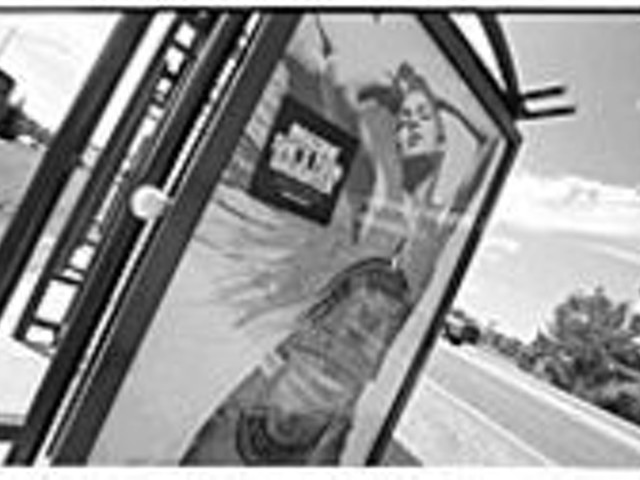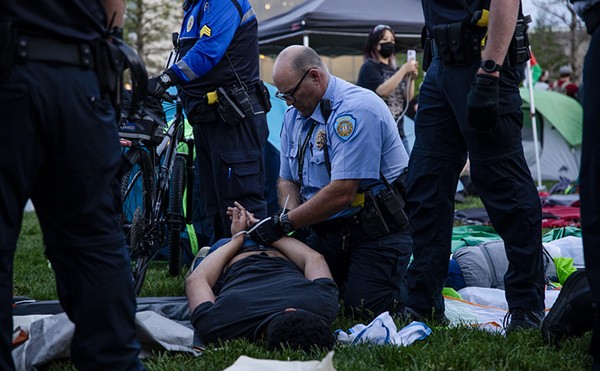Go to Arcade.
There was no rational reason to do so. The radio meteorologist put the heat index at 101 when I turned onto Midland Avenue, equidistant between the grocery store and a crumbling second-story bowling house with a couple of window air conditioners that barely wheezed and two that didn't work at all. No one goes to Arcade Lanes in the summer -- hardly anyone goes during the spring, fall or winter, for that matter. Much as I love the place, it's hell when the weather gets hot.
Go to Arcade.
It wasn't as dramatic as the disembodied voice in Field of Dreams, but the thought wouldn't leave me. If I went, I knew I'd be there at least an hour, sweat dripping from my ears as the old man told me a dozen stories I'd heard a dozen times before. Once Jim Lampson gets to talking, there's no stopping him.
Two blocks later, I'm at Olive. Turn right or left? I chose left.
As usual during the dinner hour, Lampson was sitting at the end of the bar, alone, watching the news, a just-emptied plate in front of him, his shirt unbuttoned and his belly exposed. "How ya doing, Tiger?" he said as I walked back to the refrigerator next to his office and grabbed a Bud -- the beer coolers beneath the bar had broken down several months ago.
After writing about this place ["Bowling Alone," December 19, 2001], I'd gotten hooked, joining -- and winning -- a Thursday-night handicap league with nighttime barkeep Charlie Nack as my partner and mentor. I hadn't bowled since grade school. Charlie suffered a heart attack this spring and remains in the hospital. I'd been filling in for him on occasional Saturday nights, working for beer and a key to the door so I could bowl for free in the wee hours, when the place cooled down a bit. Last Saturday had been especially profitable, thanks to a slight break in the heat and seven cellular-phone-tower installers from out of town who wandered in, pockets bulging with $20 bills and accustomed to working in the sun. Thank God only one of them wore size 10 shoes, of which there was precisely one pair. I brought in $143 and made $13 in tips.
The tally would have been higher if I'd turned on the grill when they asked for hamburgers. But with an exhaust hood that vented against the ceiling, I didn't want to fill the place with smoke. I'd once watched Lampson "fix" it. Either the insurance company or a city building inspector had been on his case about the hood fashioned from bare galvanized sheet metal. Lampson's solution was two cans of silver spray paint, which made the hood look like new, dim as the lights always were. Sipping beer and inhaling paint fumes, we'd both gotten high as kites. On the last coat, Lampson didn't check which way the nozzle was pointing and so blasted himself square in the nose. He looked like the Tin Man.
This night, after fetching my beer, I turned off the television and sat down next to him. I never bowled during these visits, especially in weather like this. Lampson would talk about the good old days and his plans -- he always had plans -- to restore this relic that hadn't changed in nearly 50 years. I'd mostly listen, once in a while pointing out when he was full of shit, which wasn't too often. Tonight, we talked about the pinsetters. They'd been acting up more than usual, refusing to return balls -- the last time I was here, just two of the eight lanes were working. At 78, Lampson was forced to rely on others, typically hired-off-the-street teenagers with few mechanical skills, to fix things as he barked instructions. He had spent most of the week tinkering with the pinsetters himself and cussing whoever it was who had screwed them up.
Talk turned to my rudimentary bowling skills, a subject we rarely broached. Lampson had taught me how to bowl, but that was more than a year ago, and I wasn't improving on my 118 average. I still rolled straight instead of curving the ball into the pocket. I'd been practicing a new style, hoping to develop a Brooklyn hook, but was almost always finding the left gutter. I think it's time for me to give up the house balls, I told him, and buy one custom-drilled for my hand.
"Go back in my office and look in the brown suitcase," he told me, oblivious to the sauna-like temperature. "There's a ball in there."
It took me a few minutes to find the case amid the papers, boxes, file cabinets and other tornado-quality clutter. The ball was classic black, with "Jim" engraved between the thumb and finger holes. I'd never seen Lampson's ball before, nor had I seen him bowl. He quit when his wife Odie took ill in 1988, dying five years later, although he told me a few days ago that he bowled two games in secret about a month back, scoring 170 and 132.
We went to Lane 6. Put your thumb in first, all the way, then just the tips of your fingers, he ordered as he stood beside me. Stand with your right shoulder lined up with the second arrow. Now, roll your strike ball. As usual, the ball landed in the gutter halfway down the lane. "That's OK," he said. "Move left about six inches." Despite the new starting point, the pins again escaped unscathed. Lampson walked about a third of the way down the alley and, facing me, put his right foot on the lane. "Move farther left, line your shoulder between the third and fourth arrow and hit my foot," he commanded.
And damned if I nearly did, knocking down all but a couple pins. With Lampson's foot as my target, I rolled about ten balls, with half staying on the lane, a considerable sight better than before. And the curve was coming. Lampson moved further down the lane, again putting his foot out. Bam. Everything but the four pin.
That's when I smelled smoke.
I walked down the lane and asked Lampson if he smelled anything. No, he said, looking puzzled. "I smell smoke," I told him as I walked back toward the bar. "I'm going to check."
A slight fog of white smoke was wafting through the billiards room next to the bar, moving toward the lanes. It wasn't as thick as the haze from Lampson grilling a hamburger, but this wasn't coming from the kitchen, and it obviously wasn't food. I raced back to Lampson. "There's a fire somewhere," I told him. "What do you want me to do?"
"Call 911," he said as he walked down the lane as fast as his septuagenarian legs would take him.
It wasn't yet clear just how serious this was. After calling the fire department, I returned to the lane for my shoes, wallet and keys that I'd left on the scoring table, leaving Lampson's ball behind.
By now, smoke was billowing past the bar and over the lanes. Lampson was peering into the billiards room, trying to spot a flame. "We need to get out of here," I told him. Just then, the electric-eye alarm that shrieked whenever anyone entered Arcade went off and wouldn't stop, whooping like a red alert on a sinking ship. As I headed for the door, Lampson went the other direction toward his office. I figured he was going for the $150 he kept in a drawer for cash-register change. "Get the money and let's get the fuck out," I shouted. But it was useless. Anyone who knows Lampson knows that he does as he damn pleases.
A police officer arrived less than a minute after I got out. We hurried to the side of the building, where we found Lampson standing on the roof. He'd gotten out through a door next to his office and was trying to figure out how to reach the fire so he could put it out with an extinguisher. The cop ordered him to stay put while firefighters arrived and set up a ladder. He got down under his own power.
The next five hours were surreal while the media and Lampson's relatives, many of them crying, descended as a life's work went up in flames. His son Jimmy, who ran a lawnmower repair shop on the ground floor, was the most distraught. I'd last seen him about a month ago, bitching about the place where he'd worked since childhood. His father had insisted on turning him into a top-notch bowler, not easing up on the practice sessions until he rolled a 300, and he told me he'd gotten so sick of it that he'd quit bowling after reaching perfection.
But Jimmy was in tears tonight. "Move out of the way," he yelled at a reporter who was interviewing Lampson as he sat in the front of a police car. The reporter stepped back, allowing Jimmy to lean in the car and hug his father. "You can't do that," Lampson told his sobbing son, rubbing the tears away with his shoulder. "Son, you can't give up." Police would later handcuff Jimmy when he tried entering his burning shop. When I asked him how he was doing, he just stood in the middle of the street, eyes never leaving the building. "My whole fucking life," he said over and over again.
Lampson was calmer than anybody. He loves being the center of attention, and he'd never gotten attention like this. "How ya doing?" he would ask as cops and journalists approached to ask questions, as if he were still behind the bar talking to customers. The sound bites were perfect as one reporter after another stuck microphones in his face. The building, he said somberly, wasn't the important thing. He was worried about the two-man saws and other ancient farm tools strapped to the walls, the woodstove that supposedly came from Jesse James' clan, his Victrolas in the billiards room and other antiques that he considered priceless.
I thought about Lampson's ball and the scoreboards on the south wall chronicling dozens of 300 games, all rolled before Odie's illness. This was where Dick Weber and other PBA stars once battled as members of the Budweisers and Falstaffs, the best teams in the nation during the Eisenhower and Kennedy administrations, when bowling was considered a sport instead of a pastime. So many bowlers scored perfect games here during the 1960s that American Bowling Congress inspectors showed up unannounced in hopes of catching Lampson doctoring the lanes. He never told anyone how he prepped the lanes, but he told me that he would spend hours working them over, sometimes until dawn.
"I only wanted to work to keep the history of Arcade Lanes," he told a television reporter. "All the success I had meant nothing to me. I don't know how bad it's going to be damaged. All I know is I don't want to lose it."
It was nearly 1 a.m. before I saw even a hint of a tear in Lampson's eyes, and it never fell. By then, it was clear that the building and everything inside was gone forever. Fire investigators suspect an electrical problem sparked the blaze.
Lampson remained stoic throughout the weekend as demolition crews leveled what remained standing. As the brick walls tumbled, he pointed out which parts of the building were original and which ones had been added on through the years, reminding everyone within earshot that Arcade was a slaughterhouse and a grocery store before it became a bowling alley in the 1940s. He even mustered cheeriness when I told him I had to leave.
"See ya, Tiger," he said with a smile and a handshake.





